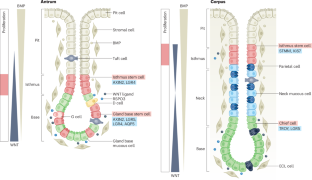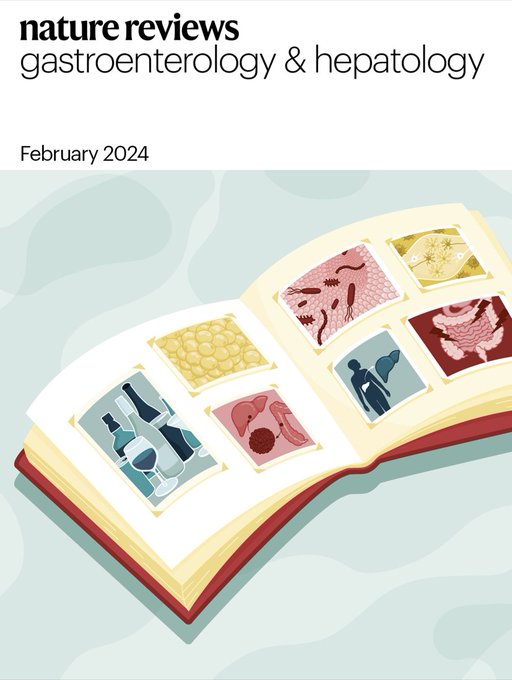幽门螺杆菌、微生物群与胃癌——微生物驱动癌变的原理
IF 51
1区 医学
Q1 GASTROENTEROLOGY & HEPATOLOGY
引用次数: 0
摘要
证明幽门螺杆菌是一种具有显著致癌潜力的致病菌,为胃癌的新预防方法铺平了道路。尽管几十年的研究已经揭示了幽门螺杆菌与上皮细胞的复杂相互作用,但目前的见解已经完善了我们对幽门螺杆菌相关癌变的看法。具体来说,对胃腺深处的胃干细胞和祖细胞的细胞类型特异性作用为细菌长期定植、操纵宿主反应和促进胃病理的能力提供了新的视角。此外,新的大规模流行病学数据揭示了决定为什么只有一小部分携带者进展为胃癌的因素。目前,技术进步带来了另一个启示:幽门螺杆菌远不是唯一能够在胃里定居的微生物。相反,胃是由不同的胃微生物群定植的,并且越来越多的证据表明,幽门螺杆菌和胃粘膜之间的异常相互作用导致了生态失调的发生和病理影响。随着这些证据的增加,我们在这里考虑从幽门螺杆菌研究中吸取的教训如何与这一新兴领域相结合,从而更全面地了解微生物在胃癌发生中的作用。本文章由计算机程序翻译,如有差异,请以英文原文为准。


Helicobacter pylori, microbiota and gastric cancer — principles of microorganism-driven carcinogenesis
The demonstration that Helicobacter pylori is a pathogenic bacterium with marked carcinogenic potential has paved the way for new preventive approaches for gastric cancer. Although decades of research have uncovered complex interactions of H. pylori with epithelial cells, current insights have refined our view on H. pylori-associated carcinogenesis. Specifically, the cell-type-specific effects on gastric stem and progenitor cells deep in gastric glands provide a new view on the ability of the bacteria to colonize long-term, manipulate host responses and promote gastric pathology. Furthermore, new, large-scale epidemiological data have shed light on factors that determine why only a subset of carriers progress to gastric cancer. Currently, technological advances have brought yet another revelation: H. pylori is far from the only microorganism able to colonize the stomach. Instead, the stomach is colonized by a diverse gastric microbiota, and there is emerging evidence for the occurrence and pathological effect of dysbiosis resulting from an aberrant interplay between H. pylori and the gastric mucosa. With the weight of this evidence mounting, here we consider how the lessons learned from H. pylori research inform and synergize with this emerging field to bring a more comprehensive understanding of the role of microbes in gastric carcinogenesis. Helicobacter pylori has a role in gastric carcinogenesis, among other bacteria. This Review elucidates the role of pathogenic microbes in gastric cancer development and provides valuable insights into the underlying mechanisms.
求助全文
通过发布文献求助,成功后即可免费获取论文全文。
去求助
来源期刊
CiteScore
52.30
自引率
0.60%
发文量
147
审稿时长
6-12 weeks
期刊介绍:
Nature Reviews Gastroenterology & Hepatology aims to serve as the leading resource for Reviews and commentaries within the scientific and medical communities it caters to. The journal strives to maintain authority, accessibility, and clarity in its published articles, which are complemented by easily understandable figures, tables, and other display items. Dedicated to providing exceptional service to authors, referees, and readers, the editorial team works diligently to maximize the usefulness and impact of each publication.
The journal encompasses a wide range of content types, including Research Highlights, News & Views, Comments, Reviews, Perspectives, and Consensus Statements, all pertinent to gastroenterologists and hepatologists. With its broad scope, Nature Reviews Gastroenterology & Hepatology ensures that its articles reach a diverse audience, aiming for the widest possible dissemination of valuable information.
Nature Reviews Gastroenterology & Hepatology is part of the Nature Reviews portfolio of journals.

 求助内容:
求助内容: 应助结果提醒方式:
应助结果提醒方式:


